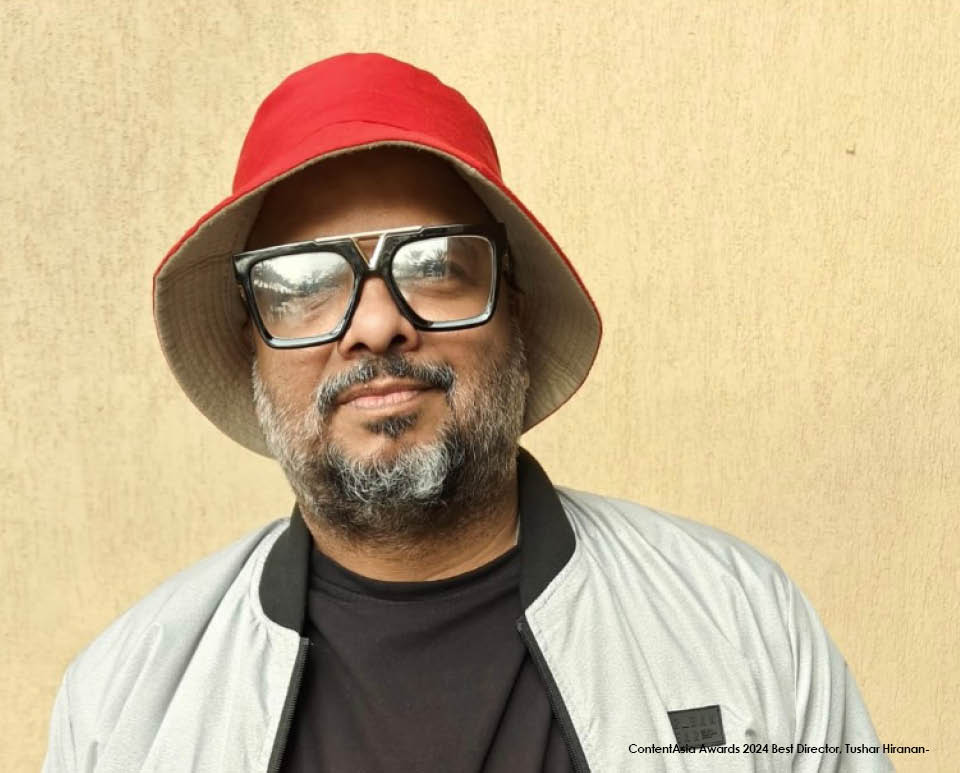
ContentAsia Awards 2024 Best Director Tushar Hiranandani’s filmography suggests a person who is, at heart, a journalist who ventured into feature films. Yet he made his name writing successful comedies such as "Masti" (now a franchise with three films), "Housefull" (2 and 4) and "Half Girlfriend".
Applause Entertainment’s "Scam 2003: The Telgi Story" with Studio Next for SonyLIV was Hiranandani first streaming series as director. The show chronicles the life of Abdul Telgi, who orchestrated India’s biggest counterfeit stamp paper scam worth Rp30,000 crore.
The Telgi scam exposed deep-seated corruption in India’s political and bureaucratic corridors of power. The TV series recreates the vibrant tapestry of the 1990s, “immersing viewers in an eye-opening tale of ambition, corruption and power”, Applause Entertainment says.
The ContentAsia Awards Jury clearly agreed, voting for Hiranandani for his treatment of this rich subject matter, his attention to detail and production design, his ability to bring characters and their journeys to life, and creating an environment where viewers become so heavily invested in the main character.
Vanita Kohli-Khandekar talked to the Mumbai-based director about being bad at studies, his best friends, cold calling director Hansal Mehta, the time Indra Kumar threw him out, and how he made his way back and up.
Your father, Ashok Hiranandani, was a film distributor. What attracted you to writing and directing? "My dad lost our house somewhere in the late 1980s, early 1990s. In those days distributors put in their own money. For me the fun part of growing up was going to the premieres of the films he distributed – Nikaah (1982), Toofan (1989), Pathar Ke Phool (1991)... Since I am dyslexic I was bad at studies. It meant spending a lot of time at home playing cricket and watching films. Movies were my best friends. When we lost everything we shifted to a one-room home in Jogeshwari (in the Western suburbs of Mumbai).
Dad had produced Indra Kumar’s first Gujarati film. Kumar gave me a job as assistant director (AD). My task was to get cigarettes and stuff for people... When the clapper boy fell ill, I was allowed on the set. Over three years of working as an AD on several films I learned so much about camera angles, lenses, about shooting.
Wh...
ContentAsia Awards 2024 Best Director Tushar Hiranandani’s filmography suggests a person who is, at heart, a journalist who ventured into feature films. Yet he made his name writing successful comedies such as "Masti" (now a franchise with three films), "Housefull" (2 and 4) and "Half Girlfriend".
Applause Entertainment’s "Scam 2003: The Telgi Story" with Studio Next for SonyLIV was Hiranandani first streaming series as director. The show chronicles the life of Abdul Telgi, who orchestrated India’s biggest counterfeit stamp paper scam worth Rp30,000 crore.
The Telgi scam exposed deep-seated corruption in India’s political and bureaucratic corridors of power. The TV series recreates the vibrant tapestry of the 1990s, “immersing viewers in an eye-opening tale of ambition, corruption and power”, Applause Entertainment says.
The ContentAsia Awards Jury clearly agreed, voting for Hiranandani for his treatment of this rich subject matter, his attention to detail and production design, his ability to bring characters and their journeys to life, and creating an environment where viewers become so heavily invested in the main character.
Vanita Kohli-Khandekar talked to the Mumbai-based director about being bad at studies, his best friends, cold calling director Hansal Mehta, the time Indra Kumar threw him out, and how he made his way back and up.
Your father, Ashok Hiranandani, was a film distributor. What attracted you to writing and directing? "My dad lost our house somewhere in the late 1980s, early 1990s. In those days distributors put in their own money. For me the fun part of growing up was going to the premieres of the films he distributed – Nikaah (1982), Toofan (1989), Pathar Ke Phool (1991)... Since I am dyslexic I was bad at studies. It meant spending a lot of time at home playing cricket and watching films. Movies were my best friends. When we lost everything we shifted to a one-room home in Jogeshwari (in the Western suburbs of Mumbai).
Dad had produced Indra Kumar’s first Gujarati film. Kumar gave me a job as assistant director (AD). My task was to get cigarettes and stuff for people... When the clapper boy fell ill, I was allowed on the set. Over three years of working as an AD on several films I learned so much about camera angles, lenses, about shooting.
When Kumar was launching his third film, I had just seen Dil Chahta Hai (2001, a cult film that defined a generation). I told him it was time for something different and he threw me out. Eventually, just when I was about to write a film for Milaap Zaveri, Kumar called me. And I narrated the film to all of them; they laughed. That is how Masti (Fun, 2004, the first film he wrote) was born.”
How did you move to directing? “I always wanted to become a director. When I got married in 2011, Nidhi (his wife, Nidhi Parmar) didn’t like what I wrote. But I enjoyed the process of writing. I had nine hits and was among the highest paid writers. In the same year I saw an episode of Satyamev Jayate (a Star TV show hosted by Aamir Khan) which featured Chandro and Prakashi Tomar (the octogenarian sisters-in-law who learned to shoot in their 60s and went on to win several national championships. Chandro died in 2021). It made me cry. And that is how Saand Ki Aankh, my first film as a director, was born. Nidhi said she would produce it (under Chalk N Cheese Productions, a banner the couple co-owns). Then we met (filmmaker and then co-founder of Phantom films) Anurag Kashyap at a wedding and he said he will produce it. Reliance Entertainment had 50% of Phantom then and they got involved. Saand Ki Aankh released in October 2019. It didn’t do well but got a lot of respect and brought me several offers from OTT.”
Then Covid happened... “I had spent so much money buying this house, we had just had our son and at one point I was writing six films. And suddenly there was no work for two years. When Scam 1992 released in October 2020, I watched it in one night. And early in the morning, I called Hansal Mehta (the director) to rave about the show. He didn’t know me. I kept in touch with him. Later on in June 2021 he offered me Scam 2003: The Telgi Story.”
Scam 2003, Saand Ki Aankh and now Srikanth. Are you becoming the biopic man? “As a writer you create heroes. But in real life there are so many wonderful unsaid stories that excite me. I cry, laugh, clap, if that happens, it is a story I want to do. Srikanth Bolla (the visually-impaired businessman on whom Hiranandani based his second film) fobbed me off for long. But eventually his partner Ravi Mantha invited me to spend three days following him around in Hyderabad. Srikanth said he had given the rights to Rakeysh Omprakash Mehra (maker of Rang De Basanti and Bhaag Milkha Bhaag, among other movies). However eventually both Ravi and Srikanth were keen that I do the film; they got the rights back from Mehra.”
You don’t write your own films? “No. Things have changed so much. And writers like Sumit (Purohit), Jagdeep (Siddhu), Karan Vyas know that I like biopics with a little tadka (zingy tempering). (Sumit and Jagdeep wrote Srikanth; Karan wrote Scam 2003) Also Bhushan (Kumar, MD of T-Series and Srikanth producer), doesn’t interfere. He gave us a free hand.”
What are you working on? “We (Chalk N Cheese) are producing a Marathi film for Zee based on true events. There are a total of three films in the pipeline.”
▶ Published in ContentAsia's 30 September 2024 eNewsletter & in ContentAsia Oct/Nov 2024 Magazine



















